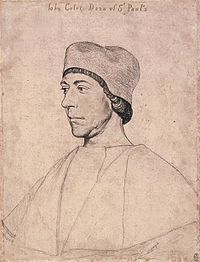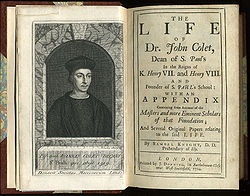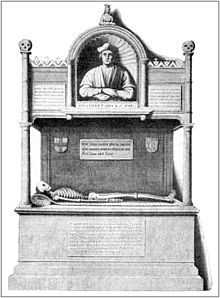- John Colet
-
John Colet 
Portrait by Hans Holbein the Younger.Full name John Colet Born January 1467
London, EnglandDied 10 September 1519 (aged 52)
London, EnglandEra Renaissance philosophy Region Western Philosophers School Renaissance philosophy Main interests Politics, history, theology Influenced byInfluenced- Erasmus
John Colet (January 1467 – 10 September 1519) was an English churchman and educational pioneer.
Colet was an English scholar, Renaissance humanist, theologian, and Dean of St. Paul’s Cathedral, London. Colet wanted people to see the scripture as their guide through life. Furthermore, he wanted to restore theology and rejuvenate Christianity. Colet is an important early leader of Christian humanism as he linked humanism and reform. Colet influenced Erasmus, a key figure in Christian humanism.
Contents
Childhood and education
The eldest son of Sir Henry Colet, (Lord Mayor of London 1486 and 1495), he was born in London in January 1467, and was educated at St Anthony's school and at Magdalen College, Oxford, where he took his M.A. in 1490. The Colet family motto is "Semper Erectus", Latin for "Always Upstanding". John took this motto to heart when he founded St Paul's School later in his career. He was already nonresident rector of Dennington, Suffolk, and vicar of St Dunstan's, Stepney, and now became rector of Thurning, Hunts. In 1493 he went to Paris and then to Italy, studying canon and civil law, patristics and Greek.
Time abroad
During his time abroad he became acquainted with Budaeus (Guillaume Budé) and Erasmus, and with the teaching of Savonarola. On his return to England in 1496 he took orders and settled at Oxford, where he lectured on the epistles of Saint Paul, replacing the old scholastic method of interpretation with one more in harmony with the new learning. Due to their influences, when he arrived back in England, he returned more than just a humanist; he returned a Christian reformer. His methods did much to influence Erasmus, who visited Oxford in 1498, and who later received an annuity from Colet.
Holding office
Since 1494, Colet had been prebendary of York, and canon of St Martin le Grand, London. In 1502 he became prebendary of Salisbury, in 1505 prebendary of St Paul's, and immediately afterwards it's dean, having previously taken the degree of doctor of divinity. He continued to lecture on the books of the Bible; and he soon afterwards established a perpetual divinity lecture, three days each week, in St Paul's itself. While at St. Paul’s between 1505 and 1519, Colet used his preaching, administration, scriptural exegesis and education towards Church reform.
Around 1508, having inherited his father's wealth, Colet formed his plan for the re-foundation of St Paul's School, which he completed in 1512, and endowed with estates of an annual value of £122 and upwards. The school, dedicated to the Child Jesus, was in place to give young boys a Christian education.
The celebrated grammarian William Lilye was the first master, and the company of mercers were (in 1510) appointed trustees, the first example of non-clerical management in education. The dean's religious opinions were so liberal that some deemed him a heretic; but William Warham, the Archbishop of Canterbury, refused to prosecute him. King Henry VIII also held him in high esteem despite his sermons against the French wars.
Colet was rector of the guild of Jesus at St Paul's Cathedral and chaplain to Henry VIII. In 1514 he made the Canterbury pilgrimage and in 1515 preached at Wolsey's installation as cardinal.
A reformer
Colet, though never dreaming of a formal breach with Roman Catholicism, was a keen reformer, who disapproved of auricular confession, and of clerical celibacy. He was a powerful force in the England of his day, helped materially to disintegrate the medieval conditions, and to introduce the humanist movement.
Sermons
Colet had many distinguished sermons. One is the beginning of the Convocation of the clergy of Canterbury province at the London Cathedral on 6 February 1512. Archbishop Warham of Canterbury invited Colet to make the speech. Colet’s speech is both direct and insightful. It represents his work, or as Colet said himself, he is “speaking out of zeal, a man sorrowing for the ruin of the Church”. Furthermore, Colet stated that he came “…here today, fathers, to admonish you with all your minds to deliberate, in this your Council, concerning the reformation of the Church”. The Convocation sermon is one of the most well known of his sermons. Many opinions regarding Colet emerged due to this sermon, in addition to the biographical information described by Erasmus. Colet has been called a pseudo-Protestant that welcomed the Reformation back to a traditional Catholic based upon this sermon.
In addition, Colet gave a notable sermon before the royal court on Good Friday, 1513. He gave this speech in the wake of political tension; specifically, an English push for war against France. In his speech, Colet condemned war and prompted Christians to fight only for Christ.
A Christian Humanist
While Colet is not as well known a Christian humanist as Erasmus, his writings are reflective of Christian humanism. In his writings, Colet refers to Italian humanists and Platonists Marsilio Ficino and Pico della Mirandola.
Erasmus said of Colet: “When I listen to Colet it seems to me that I am listening to Plato himself”[citation needed]. Erasmus likely portrayed Colet to show that one could be highly critical of the Church while still a loyal priest. His depiction of Colet was partly a depiction of himself.
Studied over time
Colet has been studied frequently over time and has experienced resurgences in popularity. Bishop Kennett studied Colet during the seventeenth and eighteenth centuries. Kennett passed his notes to Samuel Knight who utilized them to write a biography of Colet which was published in 1724. During the nineteenth century, interest in Colet increased. Several editions of his works and an additional biography were published during that time. Scholars believed Colet strongly impacted Erasmus and the English Reformation. Later critics went on view Colet as Protestant-like, though historical revisionists believe that Colet was a reform preacher that wanted to improve the quality of the Church.
Colet died in 1519 of the "sweating sickness", his monument was erected on the south aisle of the choir at the cathedral church of Saint Paul and perished in the fire of 1666.
Erasmus stated that Colet was a man for the ages and a true Christian.
Other works
In addition to his sermons Colet's works include some scriptural commentary and works entitled Daily Devotions and Monition to a Godly Life. Together with Lilye, Erasums, and Wolsey, Colet produced materials forming the basis of the authorized Latin Grammar, used for centuries in the English schools. A number of letters from Colet to Erasmus also survive.
Lasting influence of Colet
To this day, Colet's achievement is celebrated by St Paul's School, St Paul's Girls' School and Colet Court on John Colet Day at St Paul's Cathedral.
There is also a road named after him in the London suburb of Hammersmith, W6, Colet Gardens.
Colet's convocation sermon (1512)
In the introductory paragraph, Colet concludes by stating that his presence is due to the need for the Council to consider a Church reformation. First, Colet criticizes the living style of the priests. Colet explains that the priests should set an example for others as be a beacon of light, because if they are instead figures of darkness, the Church will be engulfed by darkness. Colet cites four evils, referencing the Apostle, that constitute the corrupt, priestly living: devilish pride, carnal concupiscence, worldly covetousness, and worldly occupations.
First, in regard to pride of life, Colet believes that priests of the day were more consumed by the honor and dignity one could receive by being a part of the priesthood. Service to the Church must be only humble service.
Secondly, many priests take part in the lust for the flesh: feasting and banqueting, vain conversation, sports, plays, hunting, and hawking. They are “drowned in the delights of this world” and “patronize those who cater for their pleasure”.
Thirdly, covetousness is the third worldly evil, which is also known as lust. Colet calls this a plague that has overtaken many priests and blinded many. Many take part in the Church only for the hope of riches and promotions. Priests forget that they should be interested in the good they can do more than the amount of riches that they stand to gain. Paul called covetousness the root of all evils. From it, benefices stack up, including pensions and tithes. Colet states that: “every corruption, all the ruin of the Church, all the scandals of the world, come from the covetousness of priests”.
The fourth evil arises because priests have become more servants of men than servants of God. According to Paul, priests are supposed to be an intermediary between men and God. As such, warfare should only be spiritual in nature and reflective of Jesus. In addition, they need to pray, read, and meditate regarding the Scriptures. They must deliver the word of God, give the sacraments of salvation, make sacrifices for people, and hold masses for people’s souls.
Colet then moves on to discuss the needed reformation. Paul orders that people must “be reformed into a new mind”. People should turn to humility, sobriety, charity, and spiritual occupations. Reform must begin with the priests so that it can spread throughout the Church. Colet disagrees with the creation of new laws; instead he thinks that the old laws must simply be enforced.
Colet believes several things are important: a good, pure, and holy life, approved morals, moderate knowledge of the Scriptures, knowledge of the Sacraments, the fear of God and love of the heavenly life.
Finally, Colet urges people to “return to the God of love and peace; return to Christ, in whom is the true peace of the Spirit which passeth all understanding; return to the true priestly life”. “Be ye reformed in the newness of your minds, that ye may know those things which are of God; and the peace of God shall be with you”.
Further reading
- Frederic Seebohm, The Oxford Reformers; J. H. Lupton, Life of John Colet (1887); art, in The Times, July 7, 1909.
See also
References
 This article incorporates text from a publication now in the public domain: Chisholm, Hugh, ed (1911). Encyclopædia Britannica (11th ed.). Cambridge University Press. The article is available here.
This article incorporates text from a publication now in the public domain: Chisholm, Hugh, ed (1911). Encyclopædia Britannica (11th ed.). Cambridge University Press. The article is available here.
- Olin, John C. The Catholic Reformation. New York: Fordham University, 1992.
- Colet, John. The Catholic Reformation. Olin, John C., ed. New York: Fordham University, 1992.
- Arnold, Jonathan. “John Colet- Preaching and Reform at St. Paul’s Cathedral, 1505-1519.” Reformation and Renaissance Review: Journal of the Society for Reformation Studies 5, no. 2 (2003): 204-209.
Categories:- 1467 births
- 1519 deaths
- People from London
- Clergy of the Tudor period
- English educators
- English Roman Catholics
- English Roman Catholic priests
- English philanthropists
- Alumni of Magdalen College, Oxford
- Founders of English schools and colleges
- Deans of St Paul's
- English Renaissance humanists
- Christian humanists
- Portrait by Hans Holbein the younger
- People of the Tudor period
- 15th-century English people
- 16th-century English people
Wikimedia Foundation. 2010.


